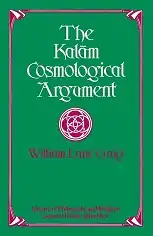The Kalām Cosmological Argument
The Kalām Cosmological Argument is a 1979 book by the philosopher William Lane Craig, in which the author offers a contemporary defense of the Kalām cosmological argument and argues for the existence of God, with an emphasis on the alleged metaphysical impossibility of an infinite regress of past events. The word 'kalam' comes from arabic and means 'the word' or 'an argument' and was originated in the medieval islamic world where scholars used to debate about the arguments or 'kalam' for the existance of god. First, Craig argues that the universe began to exist, using two philosophical and two scientific arguments. Second, Craig argues that whatever begins to exist has a cause that caused it to begin to exist. Finally, Craig argues that this cause is a personal creator who changelessly and independently willed the beginning of the universe.[1][2][3][4]
 Cover of the first edition | |
| Author | William Lane Craig |
|---|---|
| Country | United States |
| Language | English |
| Subject | Kalam cosmological argument |
| Publisher | Barnes & Noble, New York |
Publication date | 1979 |
| Media type | |
| Pages | 216 |
| ISBN | 0-06-491308-2 |
Contents
The book is divided into two parts.
- Part I: Al-Kindi, Saadia and Al-Ghazali.
- Part II: A modern defence of the Kalām cosmological argument. (Contains two appendices)
- Appendix 1: The Kalām cosmological argument and Zeno's paradoxes.
- Appendix 2: The Kalām cosmological argument and the thesis of Kant’s first antinomy.
Part I provides a brief history of the Kalām cosmological argument as stated by the Kalām tradition, with special attention to al-Kindi, Saadia and al-Ghāzāli. Part II moves to defend in length the substance of the argument.
Basic argument
- Whatever begins to exist, has a cause of its existence (i.e. something has caused it to start existing).
- The universe began to exist. i.e., the temporal regress of events is finite.
- Therefore, the universe has a cause.
Following Al-Ghāzāli, Craig argues that this cause must be a personal will.[5]
First sub-set of arguments
Argument based on the impossibility of an actual infinite:
- An actual infinite cannot exist.
- An infinite temporal regress of events is an actual infinite.
- Therefore, an infinite temporal regress of events cannot exist.
Second sub-set of arguments
Argument based on the impossibility of the formation of an actual infinite by successive addition:
- A collection formed by successive addition cannot be an actual infinite.
- The temporal series of past events is a collection formed by successive addition.
- Therefore, the temporal series of past events cannot be actually infinite.
The first is that a) an actual infinite cannot exist in the real world; and b) an infinite temporal series is such an actual infinite.
The second is that a temporal series cannot be an actual infinite, assuming than an actual infinite can exist in the real world, because: a) a temporal series is a collection formed by successive addition; and b) a collection formed by successive addition cannot be an actual infinite.
Editions
References
- Guminski, A. T. The Kalam Cosmological Argument: The Question of the Metaphysical Possibility of an Infinite Set of Real Entities, Philo, Volume 5, Number 2.
- Craig, W. L.(1979). The Kalām Cosmological Argument (1st ed.). London: Macmillan Press
- Morriston, W. , A Critique of the Kalam Cosmological Argument Archived 2011-10-15 at the Wayback Machine, God Matters: Readings in the Philosophy of Religion, Raymond Martin and Christopher Bernard (eds), (Longman, 2002), 95-108
- Morriston, W. Causes and Beginnings in the Kalam Argument: Reply to Craig Archived 2012-04-25 at the Wayback Machine, Faith and Philosophy, Vol. 19, No. 2 (April 2002), 233-244
- Wainwright, W. J., Review: The Kalām Cosmological Argument by William Lane Craig, Noûs Vol. 16, No. 2 (May, 1982), pp. 328-334. Blackwell Publishing